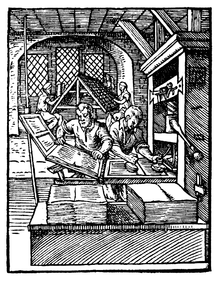 I was thinking about how PLM balance product lifecycle from the standpoint of producing and consuming product data. The product development process, obviously starts from product design, engineering and manufacturing. However, when manufacturers need to ship their product, they need to provide a significant amount of product technical and service information. It made me think about some historical parallels. So, I came to the invention of Johanes Gutenber.
I was thinking about how PLM balance product lifecycle from the standpoint of producing and consuming product data. The product development process, obviously starts from product design, engineering and manufacturing. However, when manufacturers need to ship their product, they need to provide a significant amount of product technical and service information. It made me think about some historical parallels. So, I came to the invention of Johanes Gutenber.
Johanes Gutenber
Wikipedia: Johannes Gensfleisch zur Laden zum Gutenberg (c.1398 – February 3, 1468) was a Germangoldsmithand printerwho is credited with having introduced modern bookprintinginto Europe. His probable invention of mechanical movable-type printing started the so-called “Printing Revolution” and is often regarded as the most important innovation of the modern period.[1]It played a key role in the development of the Renaissance, Reformationand the Scientific Revolutionand laid the material basis for the modern knowledge-based economyand the spread of learning to the masses.[2]
Take few more minutes to watch this video about Gutenberg technology and revolution it created.
[youtube=http://youtube.com/w/?v=qexDBgWM2X8]
The following video fragment shows the original Gutenberg process using Gutenber Press. It was a real revolution back in 1300s.
[youtube=http://youtube.com/w/?v=S-BEI_4D7tQ]
Google Books
Now, let’s move to 2000s. Google Books seems to me as a new Digital Gutenberg. The combination of Books availability and printing on demand can create a future of digital and printed information delivery. Take a look on the following video and compare it with 1300s invention.
Google Books Delivery Process
[youtube=http://youtube.com/w/?v=zyNSap5XSv0]
PLM Gutenberg
Getting back to our PLM land… PLM software vendors recognized the opportunity of digital product information delivery. It resulted in several acquisitions in the PLM world. Take a look on few examples from PLM companies related to the technical documentation and service information delivery.
PTC Arbotext Service Information
[youtube=http://youtube.com/w/?v=ValTs8k4UWU]
Dassault 3DVIA Composer
[youtube=http://youtube.com/w/?v=DA_ehmfcQMQ]
Siemens PLM TeamCenter Content Manager

What is my conclusion today? To consume product information and technical documentation is not less important than produce it. In my view, the consumption story is in a very premature state. We produce a lot of information about product. However, the process of technical documentation and other service information delivery is broken. In my, there is an opportunity to fix it. I’d be interested to know about various examples and your experience in this field.
Best, Oleg










